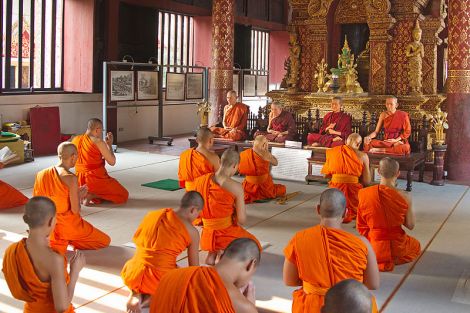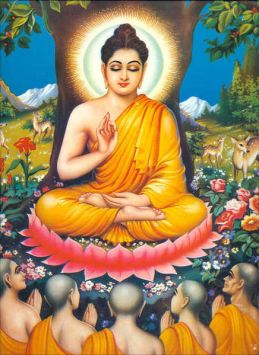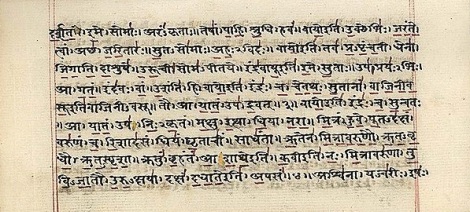Buddhism and Humanism are two geographical sides of the same philosophical coin. They’re twins with the same DNA, separated at birth, and brought up by different parents. The same dish with spices added by different cultures. Buddhism is Eastern Humanism and Humanism is Western Buddhism.
A bold claim. But before I make my case let me make a few details clear. First, by Buddhism I’m referring to what can be gathered from early and basic texts as well as modern defining figures and authorities. And yes, lay philosophy involves spirits and miracles. But I chalk this up to the doctrine of maya, or illusion. In one key use of this term it justifies lying, or at least not explaining that a metaphor is a metaphor, for the sake of teaching and future enlightenment. This is decidedly non-Humanistic, although it may have been if Humanism grew up in a world without mass public education. Further, some specific cases of apparent supernaturalism, like karma and reincarnation, I’ll discuss in Part 2.
Second, by Humanism I’m referring to the term as defined in the various Humanist Declarations and Manifestos. Most importantly, Humanism is naturalistic and based in reasoned experience over dogma. So I’ll also be including various studies from secular science and philosophy, since without prophets and holy books these are the methods by which Humanists fill in the content of their worldview. Throughout I will assume readers are a more familiar with Humanism than Buddhism.
In this first part I hope to tackle some of the most important general themes that are held uniquely by both Buddhism and Humanism. In the second part I plan to go into some more specific doctrines (which I list at the very end). Specifically, in this part, I want to argue that both have a common core in contrast to other religions and worldviews concerning
- Reason and Compassion as Our Greatest Ideals
- Personal Demonstration Over Handed-Down Dogma
- A History of Rebellion Against Religious Orthodoxy
Reason & Compassion are Our Greatest Ideals
This first point is in my opinion the strongest and most important for claiming that Buddhism and Humanism share a deep common core unique to them compared to other religions and worldviews. To make this point I’ll start with Buddhism. Damien Keown in his pioneering work relating Buddhist and Western ethics makes this point for Buddhism explicitly.
The final perfection to be attained by those who follow the path of the Arahatship is best understood in terms of a binary model, that is to say as the perfection of morality (sila) and together with the perfection of insight (panna).
But what does this morality center on? Moving closer to lay expressions of Buddhism, there are no two more popular bodhisattvas, or saints, than Manjusri and Avalokitesvara, the bodhisattvas of Wisdom and Compassion respectively. The Dalai Lama, for instance, is a reincarnation of Avalokitesvara. And while Avalokitesvara is now widely more popular, it wasn’t always so. Keown further explains:
In early Mahayana Wisdom and Mercy are regarded as equally important… In fact Wisdom is considered to be somewhat more important than Mercy… The glorification of Wisdom reaches its climax in the Madhyamaka school… [However] Mahayana slowly passes from the ascendancy of Manjusri to the reign of Avalokitesvara.
For Humanism so far Reason has always been treated as the Summum Bonum, similar to early Buddhism. But what about Compassion? The second sentence of the most recent Humanist Manifesto, defining the heart of Humanism, says it best:
The lifestance of Humanism—guided by reason, inspired by compassion, and informed by experience—encourages us to live life well and fully.
A more common buzzword for humanists is empathy. As a popular Humanist slogan goes “If you can’t determine right from wrong, you lack empathy, not religion.” More and more, science is showing that empathy is one of, if not the, most basic socio-psychological capacities we have. As Goleman in his ground breaking Social Intelligence makes clear, two of our seven most important basic needs are Caring for others and Attachment to others – the give and take of relationships. This basic need for caring and capacity for empathy is certainly shared in degrees with other animals, but only humans, at least on this earth, can express Compassion in the expansive and impartial all-of-life philosophy of Buddhist ahimsa or the equally expansive utilitarianism of atheist philosophers like Peter Singer.
All religions and worldviews prize Reason and Compassion, of course. However, all also have other ideals that they hold just as highly. My point is that Buddhism and Humanism are unique in holding these virtues up and only these virtues up. For instance, take the Abrahamic religions which put concepts like obedience, faith, and purity on the top of the list. This inevitably creates conflicts which Buddhism and Humanism don’t have, like how faith often trumps reason, e.g. Galileo and Darwin, or obedience trumps compassion, e.g. OT genocides. This leads me to my next point.
Personal Demonstration Over Handed-Down Dogma
Humanism clearly emphasizes and pounds home the virtues of critical thinking; questioning authority, especially dogmatic religious authority; the necessity of studying things for ourselves; and reason over faith. All of these are in stark contrast to the faith in and obedience to the Bibles, Korans, Vedas, and their respective prophets. But what about Buddhism with its founding ‘prophet’ and holy scriptures? Let me start with one of my favorite Buddhist koans attributed to Linji Yixuan.
When you meet the Buddha, kill him. (逢佛殺佛,逢祖殺祖)
How does this make sense given the prohibition on violence? The answer lies in the greater prohibition on upadana, or attachment, which could also be translated as blind reliance or addiction. To answer the paradox we must realize we cannot rely on anything outside of ourselves in our quest for truth and in choosing how to live. Everyone must choose a path. If a path is chosen for you, then you are merely lucky if you have the right one. We also must not interpret any source as some kind of complete and infallible truth, but continually question what we choose so we can be justified in the one we follow, responsible for our own choice, and ready if it later proves to be wrong. So if some external buddha or god or scriptures or whatnot outside of ourselves, outside of our own ‘buddha-nature‘, is being relied on then we must ‘kill’ it and detach ourselves from blind allegiance.
One story that Christians and others like to harp on is how the Buddha himself declared he was wrong and eventually changed his mind. Specifically, in this story, his disciples convinced him to allow women to become monks after he initially said no. Since Christian, Muslim, and other prophets, however, have direct lines to Omniscience, and so never change their minds, claims to have been wrong are indications that the Buddha isn’t a prophet. But Buddhists and Humanist completely agree! In comparison, they find this a wonderful story full of humility. The lesson is that we should question everything, even ourselves and the ‘experts.’ The Buddha said it best in the Kalama Sutra,
It is natural that doubt should arise in mind. I tell you not to believe merely because it has been handed down by tradition… or because it is commonly believed, or because others have told it to you, or even because I myself have said it. But whatever you are asked to believe, ask yourself whether it is true in the light of your experience, whether it is in conformity with reason and good principles, and whether it is conducive to the highest good and welfare of all beings.
As for Buddhism’s emphasis on science, a cornerstone of Humanist epistemology, I’ll end this section with one of my favorite quotations from the Dalai Lama:
As in science so in Buddhism, understanding the nature of reality is pursued by means of critical investigation: if scientific analysis were conclusively to demonstrate certain claims in Buddhism to be false, then we must accept the findings of science and abandon those claims.
A History of Rebellion Against Religious Orthodoxy
In fact, the process of continually questioning and even rejecting the reigning consensus of orthodoxy – the so-called religious ‘experts’ – is the best description of the historical births of both Buddhism and Humanism.
I remember in my first course on Hinduism the instructor explained that there was nothing defining hinduism that didn’t have its exceptions, save that every school gave at least some lip service to the Vedas. So why isn’t Buddhism just a branch of Hinduism? Because it explicitly rejects the revealed authority of the Vedas that otherwise held a monopoly over the sub-continent. It also ends up rejecting almost all of the major dogmas of Vedic Hinduism. Morally Buddhism rejected animal sacrifice, the caste system, and the religious monopoly of the Brahmins. Intellectually they had qualms with an eternal creator god(s), atman (souls), and so on. Even reincarnation, which I’ll discuss in the next post, is rejected, or at least completely reimagined.
The Buddha was a Hindu ascetic for years. He tried the faith and found it wanting. Millennia later in the West, the Freethought Movement, from which Humanism later grew, also found the Church fundamentally wanting. So they began to battle the often violent monopoly of the Christian Church. And Freethinkers, like Buddhists, rejected the reigning orthodoxy on both moral and intellectual grounds. Morally,they rejected the genocidal, hell-fire god and the intolerance this religion bred, which was evidenced in religious wars and inquisitions. Intellectually, the rejection of the Church centered on what science was bringing to light and how it too often conflicted with what the religious held as unquestionable – especially the idea something could be unquestionable.
Conclusion
Humanism and Buddhism are often considered philosophies or worldviews and not religions. This is a semantic quibble I don’t care to comment on here. But it is clear that there are some key differences that separate the two from most other religions, especially from the Abrahamic and Vedic religions they were born into. Both worldviews were born of rebellion and therefore are much more anti-authoritarian, placing an enormous emphasis on reason and thinking for ourselves. This common core I believe to be unique among worldviews.
In Part 2 I hope to go into some more specific doctrines of Buddhism that also find their analogues in the core features of Humanism. Further, these commonalities paint a wholly different picture of the world compared to Abrahamic and Vedic religions. These include:
- A Rejection of the Soul/Atman
- Aristotelian Virtue Ethics and Reincarnation Reimagined
- A Rejection of Theism
- A Focus on the Here & Now of a World Not Made for Us
Paul Chiariello (Chief Editor, Rutgers & Yale University)Paul Chiariello graduated from Rutgers in 2009 after studying Philosophy and Anthropology. Currently he is on the Board of Directors of the Rutgers Humanist Community, Co-founder of the Yale Humanist Community, and Director of the Humanism & Philo Curriculum for Camp Quest. Paul has a MSc in Sociology of Edu from Oxford, completing his field research in Bosnia on religious identity conflict. He also spent a year studying philosophy of ethics and religion at Yale on a PhD fellowship. He has worked with research organizations and schools DC, the UN, Uganda, Kenya, India, Indonesia and Germany.



I appreciate your detailed comparison of Humanism and Buddhism. When I read assertions that Buddhism, and Dharmic religions in general, promote experience over belief, I am perplexed. There are lists of 3 marks of existence, 4 noble truths, 5 Skandhas, 6 realms, an 8 fold path, all the way up to 64 thought errors. Adherents may insist that these are only guides and that one’s own experience is still paramount. Yet, practically, these doctrines guide the experience of normal people pursuing Buddhism. Likewise, Abrahamic religions (especially Orthodoxy) emphasize personal experience over dogma, as well.
LikeLiked by 1 person
To me it seems that every religion has their mystics that focus more on experience and their scholars who enjoy cataloguing. I don’t think there’s any mature religion or worldview that only focuses on one or the other.
LikeLike
Paul,
If you haven’t already, check out The Shape of Ancient Thought by Thomas C. Mcevilley, which argues that Indian thought, and possibly Buddhism, directly influenced Greek thought during of Alexander and even before when the Persian Empire contained both Greek and Indian provinces.
I agree that Humanism and Buddhism are quite compatible, and note that at the Harvard Humanist Community, we have a “secular Buddhist” mindfulness group that meets weekly. We, of course, discard the doctrine of rebirth. However, the “four noble truths” and “eightfold path” are pretty consistent with humanism. I’m a bit skeptical of the “three marks of existence” esp. “not-self” and never heard of the “64 thought errors.” Enumerated lists were a good way to remember things in a pre-literate society.
Rick Heller (@seeingtheroses)
LikeLike
Hey Rick,
I’ll definitely have to check out Mcevilley’s books. However, my point (which I work through backwards here) is that their common origins in moral and intellectual rejection of the theistic, revelatory religions of their societies and the hegemonic priesthood that ruled them led to these two religions being of a unique kind. Namely the two focus on reason and compassion over faith and obedience and, the same but put differently, have a self-reliant epistemology over dogma and religious authority. I personally think that this common birth makes them siblings more than any kind of horizontal transfer, so to speak.
I also think that Buddhist reincarnation is, and not merely that it can be interpreted loosely as, naturalistic. Many Westerners think only of Hindu reincarnation when they hear the term. And I think a lot of Buddhist groups that have used it throughout history are either influenced by Hinduism or accept it as a teaching tool using maya. For instance, I think the concepts of pratītyasamutpāda and anātman make the Hindu kind of reincarnation logically impossible in Buddhism.
LikeLike
Pingback: NEW APPLIED SENTIENCE POSTS: HOW TO BE AN ALLY, SCI LITERACY, BUDDHISM, & SUNDAY ASSEMBLY » Humanist Community at Rutgers·
Pingback: Self/No Self | Episyllogism·
Pingback: How do you define religion? | Stepping Toes·
After reading this I will start to read about buddism as to grasp what you have stated, for previously I thought about as another religion. My ignorance has suffered a blow, thank you.
LikeLike
Buddhism and humanism are not at all similar. Sit down and shut up.
http://www.ctvnews.ca/world/buddhist-mob-kills-more-than-a-dozen-rohingya-muslims-in-myanmar-rights-group-1.1641945
When is the last time you read an article like that about humanism of any sort? Never.
Even buddhists are full of shit.
LikeLike
Humanism of any sort? I guess that depends on whether you consider Marxism-Leninism to be a kind of Humanism. Here is an article about the Soviet experience:
http://www.thenewhumanism.org/authors/yakov-shapiro/articles/freedom-from-gods
Human beings are evolved apes, and viciousness, along with kindness, are part of our repertoire, no matter what ideology we adhere to.
I wouldn’t say that Buddhism and Humanism are twins, but over 2500 years, Buddhists have been trying different things, and some of the ideas they have come up with are useful. Humanism has a Eurocentric origin, and could stand to evaluate and assimilate some of the ideas originating in East Asia.
What is going on in Myanmar with the Rohingya is truly awful is a reminder that any ideology can become twisted.
LikeLike
Pingback: Honest-hearted people are losing faith in humanity and humanity losing faith in God | Belgian Biblestudents - Belgische Bijbelstudenten·